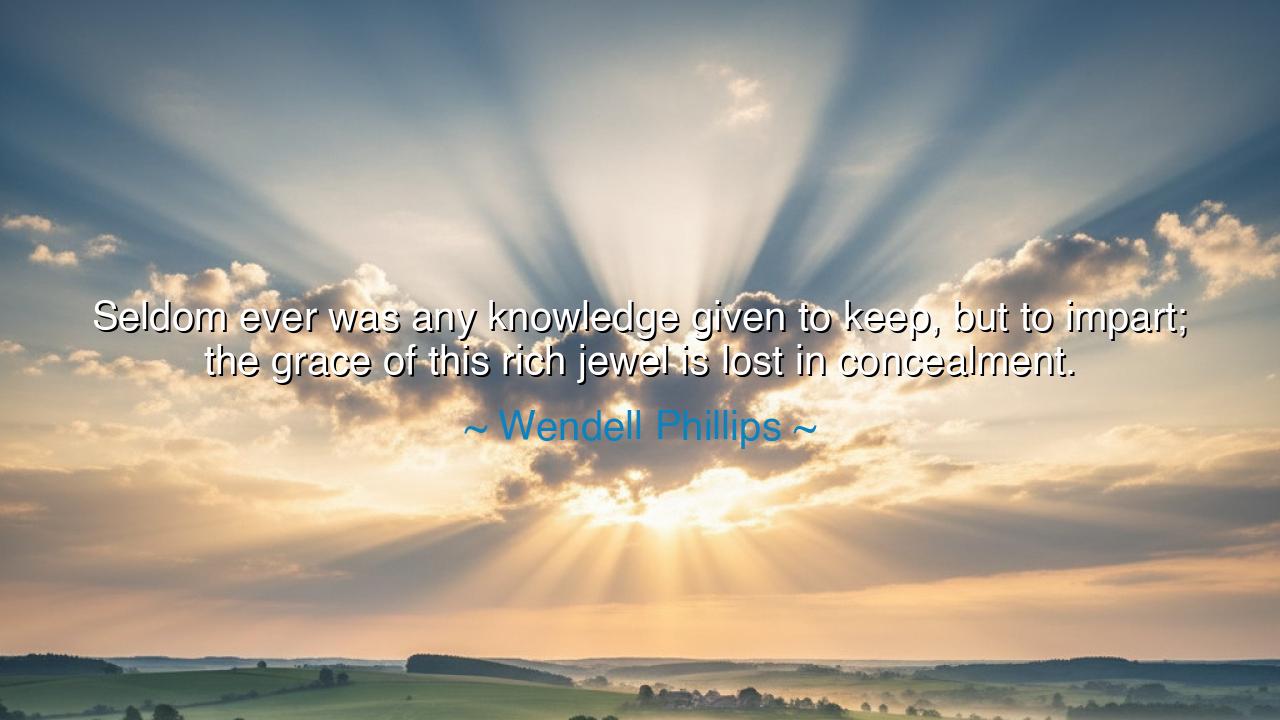
Seldom ever was any knowledge given to keep, but to impart; the
Seldom ever was any knowledge given to keep, but to impart; the grace of this rich jewel is lost in concealment.






The voice of Wendell Phillips, the great orator and champion of justice, rings with timeless conviction when he declares: “Seldom ever was any knowledge given to keep, but to impart; the grace of this rich jewel is lost in concealment.” In these words, he reminds us that knowledge, like light, was never meant to be hoarded or hidden, but to be shared, that others might see and grow. To Phillips, the possession of wisdom was not a privilege but a sacred duty. What the mind receives, it must give; what the soul discovers, it must reveal. For knowledge kept in silence becomes sterile, but knowledge shared becomes immortal.
Phillips lived in the fierce age of reform, when words were weapons and truth itself was a flame. As a leading abolitionist of nineteenth-century America, he understood that truth unspoken is truth betrayed. He watched men of intellect remain silent before injustice, their learning buried beneath comfort and fear. Thus his words are both moral and spiritual: the grace of knowledge lies not in its possession, but in its transmission. When we hide what we know—whether it be a truth, a skill, or a vision—we extinguish a light meant to guide others. Knowledge, to be alive, must circulate like blood through the body of humanity.
The ancient sages knew this truth well. Socrates wandered the streets of Athens, pouring out his wisdom freely, never hoarding it for wealth or status. He believed that teaching was an act of love, a conversation of souls. Likewise, in the East, the Buddha shared enlightenment not as a secret for the chosen few, but as a path open to all who would walk it. Both understood that the grace of knowledge is generosity—for in giving truth away, one deepens its power. As the lamp loses no light when it kindles another, so the mind loses nothing by sharing what it knows.
Consider, too, the story of Johannes Gutenberg, who gave the world the printing press. Before him, learning was a treasure guarded by the few—the scholar, the priest, the noble. But Gutenberg, through his invention, set knowledge free, scattering it like seed across the earth. The Scriptures, the sciences, the philosophies—all became accessible to common men and women. And in that sharing, civilization leapt forward. What would have become of the modern world had he kept his genius locked in secrecy? Phillips’ words remind us that every discovery, every truth, is a trust; and that the concealment of knowledge is the betrayal of its grace.
Yet his teaching is not meant for scholars alone—it is for all who live. Every person holds within them some truth, some skill, some insight born of their journey. To keep it locked away is to rob the world of its light. A mother who teaches patience, a craftsman who trains an apprentice, a teacher who opens a child’s mind—all are guardians of this sacred law. Knowledge was given to be imparted, and in its sharing, both giver and receiver are transformed. The wise become wiser through teaching, for to explain is to understand anew; and the learner, once enlightened, becomes the next bearer of the flame.
But beware, O listener, of the temptation of pride. There are those who guard their knowledge like misers, fearing to share it lest others rise beside them. Yet in so doing, they bind themselves to darkness. The grace of this rich jewel—the beauty, the vitality, the divine energy of understanding—vanishes when enclosed. True greatness lies not in possession, but in contribution. The river that hoards its water becomes a swamp, but the river that flows nourishes the land and finds renewal in its giving.
Learn, then, from the wisdom of Wendell Phillips: when knowledge comes to you, it is a gift entrusted, not owned. Speak what you know. Teach what you can. Inspire those who follow. Let your wisdom serve the living, and not lie buried in silence. If you have discovered truth, do not hoard it in fear or vanity; proclaim it with courage, for even a single spark may kindle generations.
Thus, the lesson endures: knowledge is sacred only when it is shared. Its grace, its beauty, its power—all fade in concealment but grow boundless in generosity. So let each of us be a vessel of light, passing forward the truth we have been given, that the world may shine a little brighter for our having lived. For in the end, it is not what we know that defines us, but what we have given of our knowing to others.






AAdministratorAdministrator
Welcome, honored guests. Please leave a comment, we will respond soon